Top Rankings
Mora Public School District ranks among the top 20% of public school district in Minnesota for:
Category
Attribute
Overall Rank
Highest overall rank (Top 20%)
Math Proficiency
Highest math proficiency (Top 20%)
Reading/Language Arts Proficiency
Highest reading/language arts proficiency (Top 20%)
Community Size
Largest student body (number of students) (Top 1%)
For the 2025 school year, there is 1 public preschool serving 851 students in Mora Public School District. This district's average pre testing ranking is 10/10, which is in the top 10% of public pre schools in Minnesota.
Public Preschool in Mora Public School District have an average math proficiency score of 64% (versus the Minnesota public pre school average of 45%), and reading proficiency score of 68% (versus the 47% statewide average).
Minority enrollment is 15% of the student body (majority Hispanic), which is less than the Minnesota public preschool average of 42% (majority Hispanic and Black).
Overview
This School District
This State (MN)
# Schools
4 Schools
722 Schools
# Students
1,653 Students
214,815 Students
# Teachers
109 Teachers
16,916 Teachers
Student : Teacher Ratio
15:1
15:1
District Rank
Mora Public School District, which is ranked within the top 20% of all 522 school districts in Minnesota (based off of combined math and reading proficiency testing data) for the 2021-2022 school year.
The school district's graduation rate of 80-84% has decreased from 90-94% over five school years.
Overall District Rank
#74 out of 527 school districts
(Top 20%)
(Top 20%)
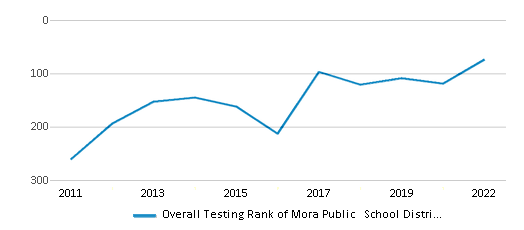
Math Test Scores (% Proficient)
52%
45%
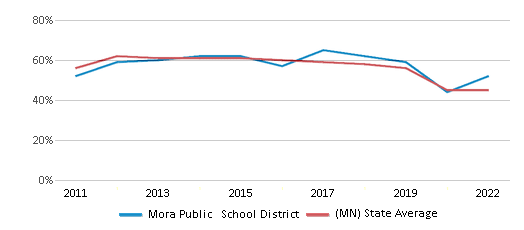
Reading/Language Arts Test Scores (% Proficient)
61%
51%
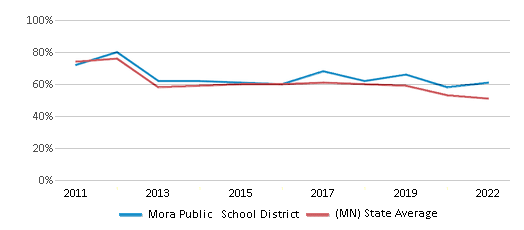
Science Test Scores (% Proficient)
49%
41%
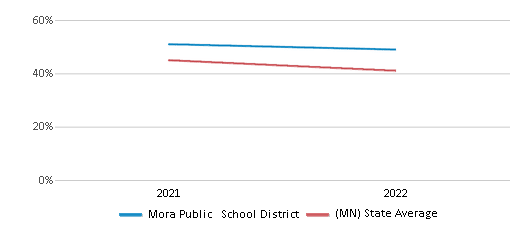
Graduation Rate
80-84%
84%
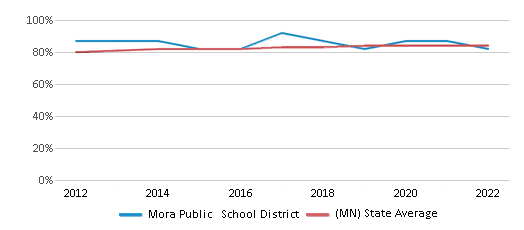
Students by Ethnicity:
Diversity Score
0.23
0.63
# American Indian Students
23 Students
4,606 Students
% American Indian Students
2%
2%
# Asian Students
23 Students
15,449 Students
% Asian Students
1%
7%
# Hispanic Students
68 Students
28,913 Students
% Hispanic Students
4%
13%
# Black Students
18 Students
27,236 Students
% Black Students
1%
13%
# White Students
1,444 Students
123,893 Students
% White Students
87%
58%
# Hawaiian Students
n/a
300 Students
% Hawaiian Students
n/a
n/a
# Two or more races Students
77 Students
14,418 Students
% of Two or more races Students
5%
7%
Students by Grade:
# Students in PK Grade:
40
24,443
# Students in K Grade:
126
34,761
# Students in 1st Grade:
130
32,541
# Students in 2nd Grade:
101
32,166
# Students in 3rd Grade:
116
29,034
# Students in 4th Grade:
101
28,343
# Students in 5th Grade:
130
24,163
# Students in 6th Grade:
107
7,122
# Students in 7th Grade:
126
1,002
# Students in 8th Grade:
125
940
# Students in 9th Grade:
131
44
# Students in 10th Grade:
136
46
# Students in 11th Grade:
149
48
# Students in 12th Grade:
135
162
# Ungraded Students:
-
-
District Revenue and Spending
The revenue/student of $13,665 in this school district is less than the state median of $17,854. The school district revenue/student has stayed relatively flat over four school years.
The school district's spending/student of $18,463 is less than the state median of $18,580. The school district spending/student has stayed relatively flat over four school years.
Total Revenue
$23 MM
$15,547 MM
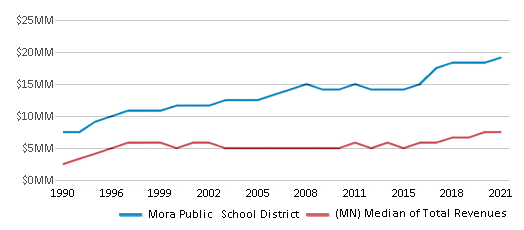
Spending
$31 MM
$16,179 MM
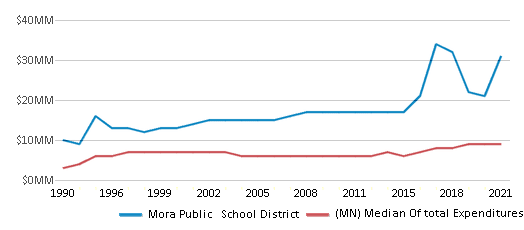
Revenue / Student
$13,665
$17,854
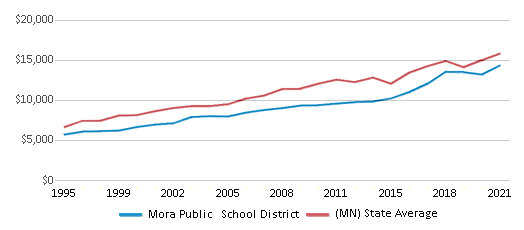
Spending / Student
$18,463
$18,580
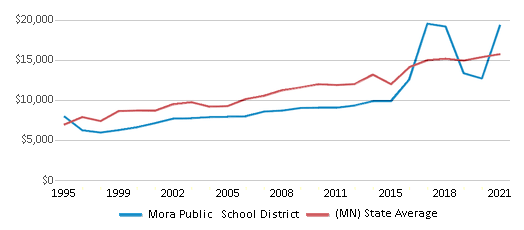
Best Mora Public School District Public Preschools (2025)
School
(Math and Reading Proficiency)
(Math and Reading Proficiency)
Location
Grades
Students
Rank: #11.
Mora Elementary School
(Math: 64% | Reading: 68%)
Rank:
Rank:
10/
Top 10%10
200 9th St N
Mora, MN 55051
(320) 679-6200
Mora, MN 55051
(320) 679-6200
Grades: PK-6
| 851 students
Recent Articles

What Is A Charter School?
Explore the world of charter schools in this comprehensive guide. Learn about their history, how they operate, and the pros and cons of this educational innovation. Discover key facts about charter schools, including admission policies, demographics, and funding, as well as what to look for when considering a charter school for your child.

10 Reasons Why High School Sports Benefit Students
Discover the 10 compelling reasons why high school sports are beneficial for students. This comprehensive article explores how athletics enhance academic performance, foster personal growth, and develop crucial life skills. From improved fitness and time management to leadership development and community representation, learn why participating in high school sports can be a game-changer for students' overall success and well-being.

February 05, 2025
Understanding the U.S. Department of Education: Structure, Impact, and EvolutionWe explore how the Department of Education shapes American education, from its cabinet-level leadership to its impact on millions of students, written for general audiences seeking clarity on this vital institution.





